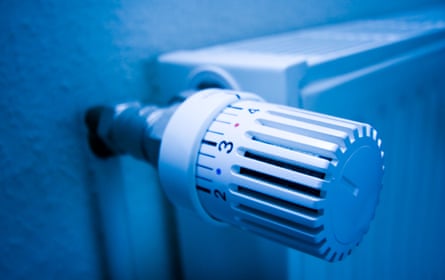Check your heating
The heavy rain and winds of recent weeks confirm that autumn is here. The warm summer months are behind us and it is time to carry out some checks to make sure your home is ready for chillier weather.
If your boiler has not had its annual service it is time to book one. This will ensure it is working as it should and uncover problems before they become bigger. Some boiler warranties will say the unit has to be serviced once a year to continue cover. Keeping a boiler serviced will also help you avoid repair costs in the future.
The website Checkatrade puts the average cost of a service at between £80 and £120, although there may be further fees to fix any problems. Make sure you use a Gas Safe registered engineer.
Put the central heating on and check each radiator to see whether part or all of it stays cold. If so, you will need to bleed it to release the trapped air inside. You will need a radiator key (50p to £3 in a DIY shop). Turn off the central heating and then open the valve with the key, releasing the air and closing it once water comes out.
To increase the efficiency of your heating, you can fit reflector panels behind radiators on external walls to reflect heat back into the room instead of losing it. Three panels are available from B&Q for £23.90.
Check that your thermostat is set to the lowest comfortable temperature, which is usually 18-21C. If you turn it down by 1C you can save £60 on heating bills, according to the Energy Saving Trust. Experts recommend that heating controls that are more than 14 years old be replaced with more modern versions.

Fix draughts
Draught-proof your home by checking for rattles, whistling noises and moving air around doors, windows, floorboards and other places with possible gaps. You can use foam, metal or plastic strips around the frames of windows to prevent gaps. Brush draught excluders can be fitted at the bottom of exterior doors, while holes in floorboards can be filled with a silicone-based filler, the Energy Saving Trust advises. It estimates you could save up to £85 a year by draught-proofing a home.
Unused chimneys are another source of draughts. You can fit a terracotta cap on top (priced at about £150), which protects from moisture and birds, or a draught excluder inside the chimney to stop warm air going up and cold coming in. Chimney Sheep draught excluders start at £19.

Sort out your tariff
Energy bills will rise for millions of households in October when the energy regulator for Great Britain, Ofgem, increases the price cap by 2% to £1,755. That is the equivalent of just over £35 extra a year for those on a standard variable tariff, although how much you pay will depend on your usage, location and method of payment.
If you are on an SVT, you can probably make savings by moving on to a fixed-rate or tracker deal. Look at comparison sites such as Uswitch or Compare the Market to see what deals are available to you. You will need to put in your address to see what is out there.
If you are already on a fixed-rate deal, check when it ends. Uswitch says 41 fixed-rate deals will finish by the end of October, and consumers on them may have to pay up to £202 a year more for their energy if they are not prepared. Households on fixed-rate deals are free to switch 49 days before the tariff ends without paying exit fees.
Luckily, according to Uswitch’s energy expert Will Owen: “This is a particularly strong time for savings, with about 26 fixed deals currently available which beat the October cap, and savings of about £241 available on the market.”
Two of the market-leading tariffs are from Outfox Energy, which is offering a 12-month fix at an average bill of £1,514 and two years at £1,516.
You should be able to switch providers within five working days. If you do switch, you have a 14-day cooling-off period where you do not have to pay any exit fees.
Safety test your gear
It could be months since you have thought about items you use to stay warm, and in the meantime they may have been deteriorating. Check they are still in working order before your need them.
Make sure your hot-water bottle is not too old – they should be replaced every two to three years. You can check the date it was made by the flower on the neck: the number in the middle is the year the bottle was made; the petals represent months and the dots weeks.

Check the wires on electric heaters. When plugged in a heater should be kept at least a metre (3ft) from surrounding objects and not left unattended for long periods of time or overnight. Plug them directly into the mains; do not use an extension lead as it may overload.
Replace electric blankets if they are soiled or worn, especially if wires are visible. If a blanket has been folded rather than rolled up, check it has not become worn along the fold lines. Replace a blanket if it is 10 years old or more. Good quality, new ones range in price from about £30 to £140.
Prepare any fireplace by having your chimney swept so your room will be well ventilated. The British Pest Control Association advises people to check their chimneys for nests of jackdaws before the arrival of autumn and cooler weather.
Make sure you have a working carbon monoxide alarm in the same room.
Test all of your smoke alarms to make sure they are working and have full batteries.
Clean up outside
Check your roof for missing, cracked or damaged tiles, particularly around the chimney, that could lead to leaks. If there are patches of green or black, this could be algae that can damage the roof. This can be treated with a soft brush, a cleaning solution or by installing zinc or copper strips, that prevent buildup. Replace any missing or slipped tiles.
Clean out the gutters to avoid flooding and damage to the roof. To get a tradesperson in to do this will cost between £50 and £300, according to Checkatrade, with prices varying depending on the size of the house and where it is in the country.
Strong winds during the autumn and winter could dislodge fence panels so make sure they are all secure.
Barbecues, trampolines and garden furniture should be put away, as should any tools that are lying around outside. If there is not space in a shed for them, cover them and secure them to the ground with weights.
If you have tender plants that will not survive colder weather, move them indoors and trim back any overgrown shrubs to reduce any risk of damage in high winds.

 3 months ago
73
3 months ago
73

















































